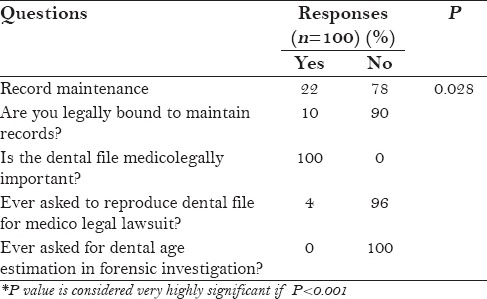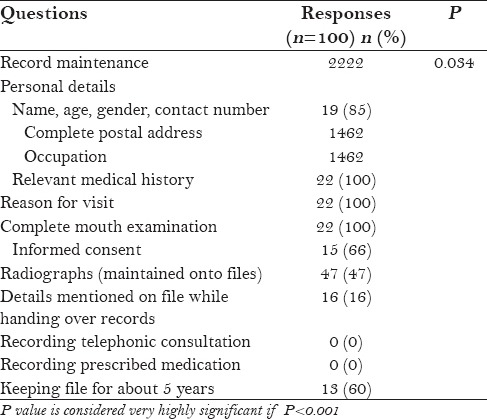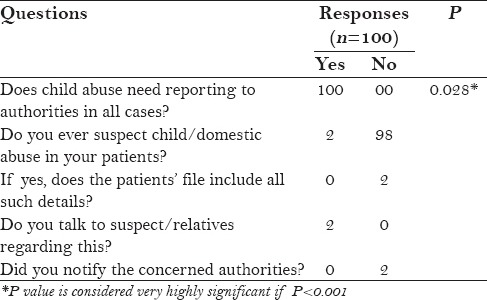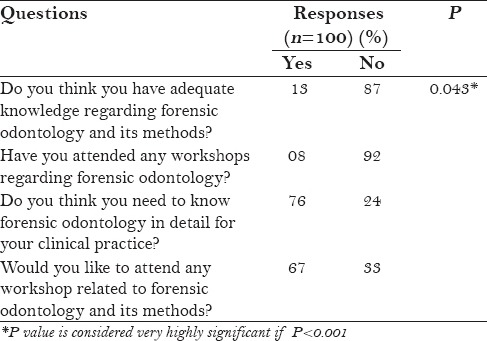Abstract
Objectives:
With the growth of forensic odontology, dental records have become an essential source of information, especially for medicolegal cases in general practice. It is mandated by the law that every dentist must keep some kind of records for every patient they treat. After the death of an individual, remnants of teeth are usually damaged at the last among all body parts. Dental records assist in personal identification in cases of mass disasters, criminal investigations, and medicolegal issues. However, in India, rules for maintaining dental records are not very strictly followed. Thus, the aim of this study was to evaluate the knowledge regarding the maintenance of dental records among dentists in Punjab and Uttar Pradesh.
Materials and Methods:
Data collection was performed via a questionnaire. The study population responded to the questions pertaining to knowledge regarding forensic odontology methods and the mode of maintaining dental records in their regular practice through a personal interview. A descriptive analysis was carried out for the data. The data were summarized and analyzed using the statistical software Statistical Package for the Social Sciences (SPSS) version 18.0.
Results:
A very low percentage (22%) of the dentists were seen to be maintaining records on a regular basis. Seventy-eight percent of the dentists were not maintaining any records.
Conclusion:
This study clearly indicates that the dentists in Punjab and Uttar Pradesh need to be properly trained for any kind of forensic and medicolegal needs.
Key words: Dental remnants, dentists, forensic odontology, medicolegal cases
INTRODUCTION
Dental records serve as an essential source of information for dentists and patients, especially for medicolegal cases in general practice. It is a legal obligation for every dentist to keep some kind of documentation for every patient they treat.[1] Maintenance of dental records is imperative for delivering high-quality patient care as well as follow-up. As general public becomes more and more aware regarding legal issues surrounding health care, a methodical information on issues related to dental records is necessary for any practitioner.[2]
Dental records play a significant role in teaching as well as in research. Dentists are bound to preserve sufficient patient records. Properly maintaining records also helps to keep good clinical practice standards.
Maintaining dental records is legally compulsory in the European and American countries,[3] however, in India, there is shear unawareness regarding the same. It was seen in a recent Indian study that a very low percentage (38%) of the dentists surveyed in that study maintained some kind of records. It was also seen that 62% percent of the dentists did not ever maintain any kind of records for the patients they treated on a daily basis. Also, very few studies are available on such kind of data from different parts of India.[4]
Thus, the present study was carried out to gauge the knowledge regarding maintaining dental records by the dentists of Punjab and Uttar Pradesh, India.
MATERIALS AND METHODS
A descriptive study was planned among 100 practicing dentists selected randomly from various parts of Punjab and Uttar Pradesh, India. This sample size was selected based on the results of power sampling derived from a previous study conducted in a similar region by Astekar et al.[4] A stratified random sampling method was employed to select dentists from various districts of Punjab. Ethical clearance was obtained from the institutional ethical committee before commencement of the study. The dentists were personally contacted over a due course of 6 months (September 2015 to March 2016); the purpose of the survey was explained and the consent was obtained.
A questionnaire was employed to evaluate the method of maintaining dental records among dental practitioners, arranged as per the American Academy of Pediatric Dentistry guidelines.[5] A pilot study was conducted on 25 dentists; their doubts related to the questions were analysed, and then the questionnaire was modified accordingly. The dentists were questioned regarding their understanding of forensic odontology and its various methods, as well as methods of record keeping. This study also took into consideration various methods used by dentists when they are faced with problem like child abuse. The questionnaire was tested to consider its feasibility and dependability; this was found to be satisfactory. Reliability for the response to questions was assessed using Cronbach's alpha (0.82). All results were analyzed using the Statistical Package for the Social Sciences, (PASW Statistics for Windows, Version 18.0. Chicago: SPSS Inc.) P value is considered very highly significant if P < 0.001.
RESULTS
A very low percentage (22%) of the dentists were seen to be maintaining records on a regular basis. Seventy-eight percent of the dentists were not maintaining any records [Table 1].
Table 1.
Knowledge regarding maintaining records and its importance among dental practitioners

The dentists were also asked whether in India it is legally considered mandatory to keep records, 90% of them gave a negative response. Further investigation revealed that only 4% were asked to produce these records in the court for medicolegal purposes. However, none of them were asked to perform age estimation procedure by evaluating teeth in forensic cases [Table 1].
Eighty five percent of the dentists definitely maintained few records, such as name, age, contact information, pertinent medical history, chief complaint, full mouth assessment, details of dental anomalies, and treatment done. Only 60% maintained these records for a minimum of 5 years. Informed consent was attained in 66% of the cases.
Although 100% of the dentists took radiographs and marked the details on it, only 47% maintained the patient files, and none of them wrote the particulars of the radiographs in the patient files. Only 16% took signatures when the radiographs or models were handed over to patients for their need. Other data, such as address, occupation, and dentition details were found in about 62% of the records. None of them recorded the telephonic conversation or the drugs prescribed [Table 2].
Table 2.
Distribution of various parameters maintained in the records

Regarding suspicion of child abuse in patients, only 2% suspected for child abuse and talked to the relatives, however, none of them had informed the concerned authorities [Table 3].
Table 3.
Dental practitioners’ response to maintenance of dental records in cases of child/domestic abuse

When asked regarding their awareness of forensic odontology methods, it was seen that only 13% of the dentists thought that they knew about it adequately. It was seen that 76% of the dentists thought that they needed proper knowledge regarding the methods of forensic odontology in their day-to-day clinical practice. It was also seen that 67% of the dentists wanted to attend programmes for increasing their knowledge regarding forensic odontology [Table 4].
Table 4.
Knowledge regarding forensic odontology and its importance among dental practitioners

DISCUSSION
Maintenance of patient records is desirable both legally as well as ethically to safeguard ourselves against any kind of medicolegal lawsuit. Records, including medical and dental history, radiographs, models, and photographs are of utmost importance while facing litigations when subjected to a court of law, and hence, must be scrupulously kept. It is a well-approved fact that during a lawsuit, more than the patient's recollections, dentist's written records are given more weightage.[6]
The results of the present study demonstrate that, among the dentists surveyed, 90% were not aware that in India it is considered to be legally obligatory to preserve records. This shows that majority of the dentists are usually ignorant regarding the laws prevailing in their profession.
It is clearly stated under Article 51 A(h) of the Indian Constitution that it is a moral responsibility on the part of a doctor, and his/her legal obligation, to sustain and conserve medical and medicolegal documents for the best interest of communal and professional integrity.[4] Records and official documents should be conserved for surveillance for a bare minimum of 8 years to evade penalty under Section 271[1] of the Income Tax Act, 1961.[4]
It was seen that dealing with the quality of maintained records, a very low percentage (22%) of the participants were seen to maintain even bare minimum records. Other data, such as address, occupation, and dentition details were found in about 62% of the records. Even the informed consent was not attained by 34% of the dentists. However, not much of a different story prevails in the rest of the world.
A survey conducted among a random sample of 750 Minnesota dentists using the questionnaire by American Dental Association revealed that no information was present in 9.4–87.1% of the occasions. Only 15% of the participants were found to be using a one-page record format, and 44% used a multiple-page form which was filed in a specified position inside the record. Thus, it was deduced that insufficient dental record workings should be targeted for enhancement.[7]
In the present study, only 4% of dentists were required to produce records in any kind of forensic or legal litigation. Very few studies have evaluated the actual need of these records in some kind of cases. Dentists can turn into important members for the dental recognition procedure by maintaining proper standards of record-keeping, which would be helpful to reinstate their patients' identity.
When the participants were questioned regarding the suspicion of child abuse in their patients, it was seen that only 2% had ever suspected abuse in patients, however, none of them informed any concerned authorities.
It is a well-known fact that the diagnosis of child sexual abuse can usually be made based on the child's history. General physical examination of the child itself is rarely of a diagnostic value until supported by proper history and/or few specified laboratory tests. It becomes the moral duty of the attending physician to construe trauma, accumulate specimens, cure the injury, and in all available measures, support the susceptible patient. Paying proper attention to these details will help the patient by improving the standards of classification of injury and warrant more effectual investigations.[8]
When asked regarding their awareness of forensic odontology methods, it was seen that only 13% of the dentists thought that they knew about it adequately. It was seen that 76% of the dentists thought that they needed proper knowledge regarding the methods of forensic odontology in their day-to-day clinical practice. It was also seen that 67% of the dentists wanted to attend programmes for increasing their knowledge regarding forensic odontology. Thus, this study also showed that the dentists were interested to learn proper methods to tackle cases of criminal lawsuit.
The results of the present study, however, suggested that in Punjab and Uttar Pradesh, either the dentists do not preserve any records or have few records that can be easily deemed inadequate for such investigations. Thus, a focus on increasing the awareness regarding maintenance of good quality records should be of a prime concern, which would help these dentists prepare for forensic and medicolegal needs.
The strengths of this study were that the study questionnaire was based on a standard format adapted from the American Academy of Pediatric Dentistry[5] which is a benchmark for studies on record maintenance all over the world. Thus, this study can be used for comparisons of Indian standards of record maintenance all over the world. However, further studies should include a larger sample size and a possible stratification into the deeper rural areas of India, which were not included in the present study because it is a first of its kind in the present area.
The overall quality of records kept in this study by dentists was really poor, and sadly in accordance with the rest of the world.[7,9] The need of the hour is to recognize the problems prevailing among dentists which leads to inadequacies in many existing dental record systems. Preparation of a proper document to guide the dentists on recording the examination in dental practice should be enforced.[10] Proper teaching protocols should be mandated for undergraduates[11] and postgraduates alongside raising the awareness standards among practicing dentists.[12]
Systematic reviews would help us to better understand the state of forensic odontology and record maintenance. However, due to paucity of studies on the present topic, very few systematic reviews have been conducted,[13] and they have also concluded that studies that involve dentists from rural areas and all states of the country should be conducted so that more data of a significant stature can be obtained.
To summarize, this study found a real bad state of maintenance of dental records with only 22% of the practising dentists maintaining at least some kind of record. It was seen that even informed consent which in medicolegal cases can act as a saviour for a doctor was obtained by only 15% of the dentists. Surprisingly, only 13% doctors confirmed that they had adequate knowledge regarding the methods and techniques of forensic odontology. With such standards of knowledge and mindset, we can imagine how prepared we are to face, if any, kind of medicolegal lawsuit.
CONCLUSION
The present study concluded that the status of record maintenance among dentists of Punjab and Uttar Pradesh was really poor because only 22% of practicing dentists were found to be maintaining some kind of dental records. Further nationwide studies with a larger sample, proper randomization, and including more specified criteria are necessary to conduct a systematic review on the knowledge and attitude of practicing dentists regarding record maintenance and forensic odontology and thereby, to conclude the standards that prevail in the Indian society. Thus it is very important to train the dentist regarding record maintenance and forensic odontology methods so as to assist them and prepare them to tackle any kind of medicolegal condition.
Financial support and sponsorship
Nil.
Conflicts of interest
There are no conflicts of interest.
REFERENCES
- 1.Waleed P, Baba F, Alsulami S, Tarakji B. Importance of dental records in forensic dental identification. Acta Inform Med. 2015;23:49–52. doi: 10.5455/aim.2015.23.49-52. [DOI] [PMC free article] [PubMed] [Google Scholar]
- 2.Griffith R. Understanding the Code: Keeping accurate records. Br J Community Nurs. 2015;20:511–4. doi: 10.12968/bjcn.2015.20.10.511. [DOI] [PubMed] [Google Scholar]
- 3.Devadiga A. What's the deal with dental records for practicing dentists? Importance in general and forensic dentistry. J Forensic Dent Sci. 2014;6:9–15. doi: 10.4103/0975-1475.127764. [DOI] [PMC free article] [PubMed] [Google Scholar]
- 4.Astekar M, Saawarn S, Ramesh G, Saawarn N. Maintaining dental records: Are we ready for forensic needs? J Forensic Dent Sci. 2011;3:52–7. doi: 10.4103/0975-1475.92143. [DOI] [PMC free article] [PubMed] [Google Scholar]
- 5.American Academy of Pediatric Dentistry. Guideline on Record keeping. Pediatr Dent. 2004;34:132–6. [Google Scholar]
- 6.Jerrold L. Litigation and Legislation. Who is entitled to what? Am J Orthod Dentofacial Orthop. 2015;148:1075–7. doi: 10.1016/j.ajodo.2015.09.005. [DOI] [PubMed] [Google Scholar]
- 7.Osborn JB, Stoltenberg JL, Newell KJ, Osborn SC. Adequacy of dental records in clinical practice: A survey of dentists. J Dent Hyg. 2000;74:297–306. [PubMed] [Google Scholar]
- 8.Sakelliadis EI, Spiliopoulou CA, Papadodima SA. Forensic investigation of child victim with sexual abuse. Indian Pediatr. 2009;46:144–51. [PubMed] [Google Scholar]
- 9.Morgan RG. Quality evaluation of clinical records of a group of general dental practitioners entering a quality assurance programme. Br Dent J. 2001;191:436–41. doi: 10.1038/sj.bdj.4801201. [DOI] [PubMed] [Google Scholar]
- 10.Ireland RS, Harris RV, Pealing R. Clinical record keeping by general dental practitioners piloting the Denplan ‘Excel’ Accreditation Programme. Br Dent J. 2001;191:260–3. doi: 10.1038/sj.bdj.4801158a. [DOI] [PubMed] [Google Scholar]
- 11.Wald HS, George P, Reis SP, Taylor JS. Electronic health record training in undergraduate medical education: Bridging theory to practice with curricula for empowering patient- and relationship-centered care in the computerized setting. Acad Med. 2014;89:380–6. doi: 10.1097/ACM.0000000000000131. [DOI] [PubMed] [Google Scholar]
- 12.Cole A, McMichael A. Audit of dental practice record-keeping: APCT-coordinated clinical audit by Worcestershire dentists. Prim Dent Care. 2009;16:85–93. doi: 10.1308/135576109788634296. [DOI] [PubMed] [Google Scholar]
- 13.Gambhir RS, Singh G, Talwar PS, Gambhir J, Munjal V. Knowledge and awareness of forensic odontology among dentists in India: A systematic review. J Forensic Dent Sci. 2016;8:2–6. doi: 10.4103/0975-1475.176954. [DOI] [PMC free article] [PubMed] [Google Scholar]


